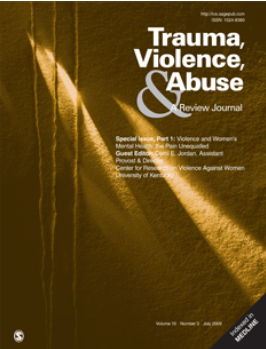男孩和男人披露性创伤的障碍和促进因素:系统综述
IF 5.4
1区 社会学
Q1 CRIMINOLOGY & PENOLOGY
引用次数: 0
摘要
披露性创伤可以帮助受害者-幸存者恢复和康复。尽管有证据表明暴露于性创伤的男孩和男人的披露率低,披露延迟时间长,但对影响这一群体披露的因素知之甚少。进行了一项系统回顾,以整合有关男孩和男性在性创伤(即性虐待、性侵犯和胁迫)后披露可能性和时间的障碍、促进因素和预测因素的证据。披露包括正式报告、寻求帮助和与社会支持的讨论。检索了四个电子数据库(PsycINFO、CINAHL、SCOPUS和Medline),纳入了69篇文章(42篇定性方法,25篇定量方法,2篇混合方法),代表了10,517名暴露于性创伤的男孩和男人,以及297名支持暴露于性创伤的男孩和男人(如警察、精神卫生从业人员)。根据社会生态的不同层次绘制了障碍和促进因素图。男孩和男人对性创伤的理解和反应是由男性规范的违反和对他们创伤的最低限度的公众承认和认可所决定的。这些因素由于缺乏适当的支持和从业人员知识而变得更加复杂。评估的披露结果的预测因素是高度可变的,这表明对可能影响披露的因素的理论理解有限,需要更严格的方法和将理论整合到这一领域。奖学金仍然偏向于披露障碍,很少强调支持寻求帮助的基于优势的因素。研究结果强调了性别社会化过程对长期性创伤经历的影响。讨论了对实践、政策和研究的影响,包括提高对性创伤暴露男孩和男人的认识和支持的必要性。本文章由计算机程序翻译,如有差异,请以英文原文为准。
Barriers and Facilitators for Sexual Trauma Disclosure in Boys and Men: A Systematic Review
Disclosing sexual trauma can support recovery and healing for victim-survivors. Despite evidence indicating low disclosure rates and long disclosure delays in sexual trauma-exposed boys and men, little is known about factors impacting disclosure in this group. A systematic review was conducted to consolidate evidence surrounding barriers, facilitators, and predictors of disclosure likelihood and timing in boys and men following sexual trauma (i.e., sexual abuse, assaults, and coercion). Disclosure included formal reporting, help-seeking, and discussions with social supports. Four electronic databases (PsycINFO, CINAHL, SCOPUS, and Medline) were searched and 69 articles (42 qualitative, 25 quantitative, two mixed-methods) were included, representing 10,517 sexual trauma-exposed boys and men and 297 supports of sexual trauma-exposed boys and men (e.g., police, mental health practitioners). Barriers and facilitators were mapped according to levels of the social ecology. Boys’ and men’s understanding of, and responses to, sexual trauma were informed by perceived masculine norm violations and minimal public acknowledgement and validation of their trauma. These factors were compounded by a dearth of appropriate supports and practitioner knowledge. Assessed predictors of disclosure outcomes were highly variable, indicating limited theoretical understanding of factors likely to impact disclosure and need for greater methodological rigor and integration of theory into this domain. Scholarship remains biased towards disclosure barriers, with little emphasis on strengths-based factors that support help-seeking. Findings highlight impacts of gender socialisation processes on long-term experiences of sexual trauma. Implications for practice, policy, and research are discussed, including need for greater awareness and support for sexual trauma-exposed boys and men.
求助全文
通过发布文献求助,成功后即可免费获取论文全文。
去求助
来源期刊

Trauma Violence & Abuse
Multiple-
CiteScore
13.60
自引率
7.80%
发文量
131
期刊介绍:
Trauma, Violence, & Abuse is devoted to organizing, synthesizing, and expanding knowledge on all force of trauma, abuse, and violence. This peer-reviewed journal is practitioner oriented and will publish only reviews of research, conceptual or theoretical articles, and law review articles. Trauma, Violence, & Abuse is dedicated to professionals and advanced students in clinical training who work with any form of trauma, abuse, and violence. It is intended to compile knowledge that clearly affects practice, policy, and research.
 求助内容:
求助内容: 应助结果提醒方式:
应助结果提醒方式:


